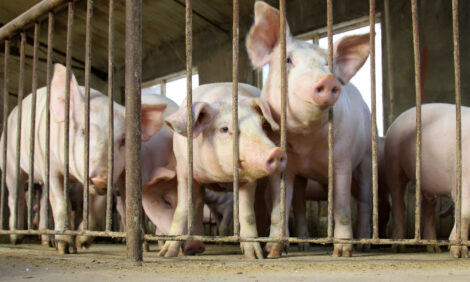



Ileitis strikes high performing herds
High-Health facilities foster the optimum environment for high-performance pigs. However, ileitis often strikes well managed operations causing production variation, loss of performance and lower output. - David Bane DVM, Elanco Animal Health.|
Seeking a Solution Ileitis symptoms have been recognised for years, but positive identification of its cause remained elusive until the mid '90s. Elanco Animal Health, a long-time collaborator with swine researchers around the world, has invested millions of dollars and years of study in understanding all aspects of ileitis. In 1996, Elanco's Tylan Premix® received the first and only FDA approval for prevention and control of this costly disease. Today, Tylan remains U.S. veterinarians' first choice for ileitis treatment. |
Widespread disease mocks progress
Pig farmers who use sound management practices such as all-in/all-out, segregated early weaning and multisite production, expect and often achieve a high level of herd health and solid pig performance. However, even the best management can't control one of today's growing swine health threats - ileitis.Veterinarians agree that ileitis doesn't discriminate in the operations it invades. "Ileitis is present in nearly every herd and it often expresses itself in the most high health status operations," says David Bane, a veterinarian with Elanco Animal Health in Sidney, Ill.
Universal disease
Even though great strides have been made in herd health over the last decade, tests indicate the causative agent of ileitis, Lawsonia intracellularis, is now present in 96.2% of all U.S. swine herds.1 But why is ileitis threatening the best-run operations? Swine health experts cite several possible reasons Less Immunity. Modern production practices limit bacteria transmission from sows to baby pigs. While this limits vertical disease transmission, it also creates less opportunity for pigs to develop adequate immunity to intestinal diseases like ileitis. Purchased Breeding Stock. As more farmers try to speed genetic progress, many buy replacement gilts and boars from outside sources. This may also increase the risk for disease. Not following recommended isolation periods only adds to this potential risk. Stress. Ironically, today's more prolific and better-performing pigs can lead to overcrowding in facilities designed for lower throughput. This, along with frequent ration changes, mixing and transporting, contributes to stress, which can result in increased vulnerability to disease.Chronic and acute problem
Ileitis often strikes high-performing herds quietly in its subtle, yet costly, chronic form. Pigs afflicted with this form can go undetected. However, close inspection yields the tell-tale signs of the disease which include: loose stools, gauntness, loss of appetite, undigested feed in stool, poorer feed efficiency, reduced rate of gain and reduced breeding-herd performance, increased group weight variability and increased culls.In published studies, pigs with chronic ileitis have shown a decrease in average daily gain of 9% to 35% which results in more days to market.2
Combined with a feed efficiency that worsens by 6% to 20% and packer discounts due to ileitis-caused variation, the disease costs farmers as much as US$22.19 per head.3
"Every farmer should be concerned about ileitis" says Dr. Bane. "The disease thickens the intestinal wall which slows and interrupts normal digestion. As a result, farmers see negative impacts on feed efficiency, rate of gain and breeding herd performance."
When ileitis strikes in its acute form, farmers take notice - pigs die. Typically, the fast-acting form of the disease can produce death losses from 1% to 5%. While not as common as chronic ileitis, this form can be devastating in expensive breeding-herd animals.
"In its acute from, ileitis can kill pigs quickly", says Bane. "Yet, farmers should be more concerned with chronic ileitis since it causes a continuous drain on profits."
| Usage instruction and withdrawal periods may vary by country. Always follow label directions. For more information contact your local Elanco office which can be found in out business directory. |
Approved Solution
Today, farmers have a real option to control ileitis."Tylan® Premix in the feed gets to the core of the problem by controlling the causative agent of ileitis." says Bane. "In the end, that means improved overall performance for better returns."
Tylan Premix® is the only FDA-approved product for the prevention and control of ileitis.
Find out more about Tylan Premix® or visit the Elanco Animal Health web site.
Tylan® is a trademark for Elanco's brand of tylosin. ©2000 Elanco Animal Health
References available upon request.







